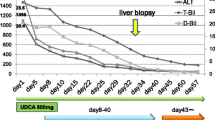Abstract
Sorafenib, a multikinase inhibitor targeting angiogenesis, cell survival, and proliferation in hepatocellular carcinoma (HCC) is a standard therapy for advanced stage disease. However, its utilization as neoadjuvant therapy is under investigation and remains an off label indication. The use of sorafenib in pre-liver transplant setting raises caveats associated with risk of bleeding, wound healing deficiencies, and hepatic decompensation. Herein, we report the case of a patient who after exhibiting HCC relapse post-hepatic resection underwent sorafenib therapy and subsequent transplantation. Sorafenib was well tolerated, and no adverse events were noticed. The use of sorafenib as neoadjuvant therapy in pre-transplant patients is feasible and deserves investigation in large clinical settings.




Similar content being viewed by others
References
Llovet JM, Burroughs A, Bruix J. Hepatocellular carcinoma. Lancet. 2003;362:1907–17.
Wang ZL, Liang P, Dong BW, Yu XL, de Yu J. Prognostic factors and recurrence of small hepatocellular carcinoma after hepatic resection or microwave ablation: a retrospective study. J Gastrointest Surg. 2008;12:327–37.
Mazzaferro V, Regalia E, Doci R, Andreola S, Pulvirenti A, Bozzetti F, et al. Liver transplantation for the treatment of small hepatocellular carcinomas in patients with cirrhosis. N Engl J Med. 1996;334:693–9.
Yao FY, Kerlan RK Jr, Hirose R, Davern TJ III, Bass NM, Feng S, et al. Excellent outcome following down-staging of hepatocellular carcinoma prior to liver transplantation: an intention-to-treat analysis. Hepatology. 2008;48:819–27.
Otto G, Herber S, Heise M, Lohse AW, Monch C, Bittinger F, et al. Response to transarterial chemoembolization as a biological selection criterion for liver transplantation in hepatocellular carcinoma. Liver Transpl. 2006;12:1260–7.
Llovet JM, Ricci S, Mazzaferro V, Hilgard P, Gane E, Blanc JF, et al. Sorafenib in advanced hepatocellular carcinoma. N Engl J Med. 2008;359:378–90.
Printz C. Clinical trials on note. Sorafenib as adjuvant treatment in the prevention of disease recurrence in patients with hepatocellular carcinoma (STORM). Cancer. 2009;115:4646.
Rampone B, Schiavone B, Confuorto G. Current management of hepatocellular carcinoma. Curr Oncol Rep. 2010;12:186–92.
Chapman WC, Majella Doyle MB, Stuart JE, Vachharajani N, Crippin JS, Anderson CD, et al. Outcomes of neoadjuvant transarterial chemoembolization to downstage hepatocellular carcinoma before liver transplantation. Ann Surg. 2008;248:617–25.
Ko HK, Ko GY, Yoon HK, Sung KB. Tumor response to transcatheter arterial chemoembolization in recurrent hepatocellular carcinoma after living donor liver transplantation. Korean J Radiol. 2007;8:320–7.
Author information
Authors and Affiliations
Corresponding author
Rights and permissions
About this article
Cite this article
Kim, R., Menon, N. & Aucejo, F. Safe use of sorafenib in a patient undergoing salvage liver transplantation for recurrent hepatocellular carcinoma after hepatic resection. Med Oncol 28, 1044–1047 (2011). https://doi.org/10.1007/s12032-010-9625-x
Received:
Accepted:
Published:
Issue Date:
DOI: https://doi.org/10.1007/s12032-010-9625-x




